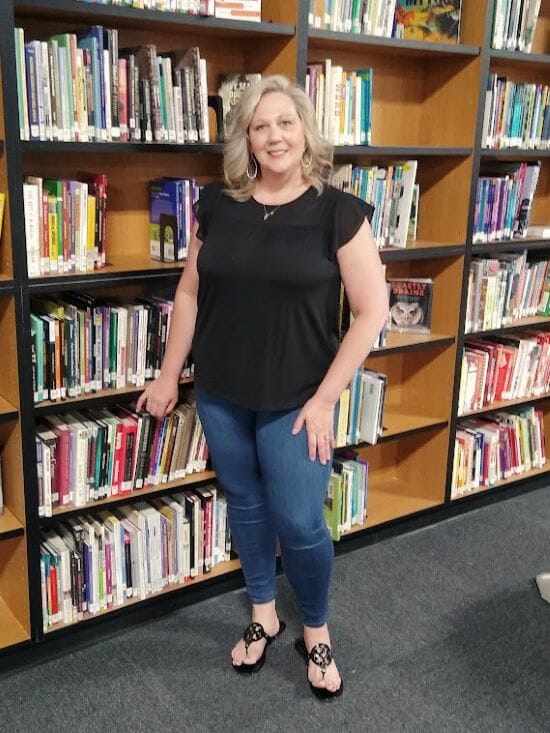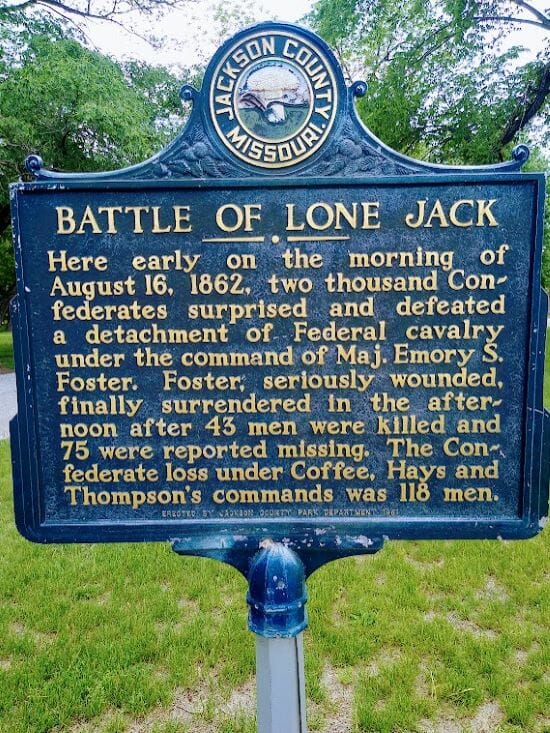- Home | Commentary |
- Lone Jack High School Teacher Battles Antisemitism
Lone Jack High School Teacher Battles Antisemitism The Danger of 'Othering'
Published June 25th, 2023 at 6:00 AM
Above image credit: This museum in Lone Jack, Missouri, tells the story of an 1862 Civil War battle in the small, eastern Jackson County town. (Bill Tammeus | Flatland)LONE JACK, Missouri — When you think of this small town of about 1,600 people in eastern Jackson County (if you ever do), what comes to mind? (I’ll wait.)
While I waited, I bet you discovered that a minor Civil War battle was fought there on Aug. 16, 1862, when Confederate troops took five hours to whip Union troops on the town square. That is why there’s a small history museum in town today.
And maybe you also discovered that the town’s name came from a single blackjack oak tree that once stood as a landmark there.
But here’s what you probably missed: A Lone Jack High School teacher, Angela Gottesburen, last month was named Holocaust Educator of the Year by the Midwest Center for Holocaust Education (MCHE).

Beyond that, four of this year’s five winners in the upper division (10th through 12th grade) of MCHE’s annual White Rose Research Contest were her students — Makenzie Brantner, Meredith Cole, Sarah Gillespie and Jack Stevenson.
That contest gives students a chance to learn about the young people in the White Rose movement during World War II who worked surreptitiously against the Nazis. It also gives them a chance to show what they’ve learned in their study of the Nazi-led murder of six million Jews and others in World War II and how they can apply that to their lives today.
In fact, Angie Gottesburen has lit a light of inquiry and knowledge in little Lone Jack, and it all grew out of her experience of reading Ellie Wiesel’s remarkable Holocaust memoir, “Night”, when she was 14 years old and growing up in Blue Springs and Independence.
“I considered myself a nerd or a knowledge seeker,” she says. “I love just learning new things. I love history and I’m very compassionate and I hate injustice.”
In some ways, it’s all family connected, too, given that her married name is German as is her maiden name, Moehlman. And in junior high and high school, she studied German for five years.
Americans with German backgrounds, like Gottesburen (and me), have complicated relations with German history in that some of us try to discover whether people with our last names in Germany in World War II were active Nazis, resisters, bystanders or some combination. Answers aren’t easy to find.
For 16 years, Gottesburen has been a school librarian and, more recently, a teacher in Lone Jack. She’s still the librarian there but now teaches both English and a popular one-semester elective course on the Holocaust, which she’s done since 2016, except for a two-year pandemic-caused break.

She’s been awarded fellowship money to visit Poland, where the Germans built most of their death camps, and she uses that experience, including her visit to the most famous camp, Auschwitz-Birkenau, to add depth and insight to her teaching.
“Going to Auschwitz,” she says, “made why I think about the Holocaust so much clearer and it became even more important to me. It became more like an honorable deed that I teach about it.”
Lone Jack’s population, at 90% white, is not very diverse. For instance, Gottesburen says the only Jewish student in the high school graduated a year ago.
“But to me,” she says, “that makes it even more important to teach a class like this. The biggest way to overcome hatred is to get to know other people.”
In fact, it’s one of the primary reasons she has devoted so much time and effort to teaching about how Adolf Hitler’s Nazi government made it state policy to eliminate European Jewry, a genocidal goal of incomparable evil that wound up being about two-thirds successful with the murder of six million Jews.
“One of the biggest things I’ve taken away (from Holocaust studies),” she says, “is how much danger lies in ‘othering,’ thinking of someone as ‘other.’ I tell my students that, too. It’s thinking like that that paves a dangerous, dangerous road. Also, so many people (in World War II) did nothing (to save Jews), and that just breaks my heart.”
Gottesburen constantly looks for opportunities to take students beyond Lone Jack to learn. For instance, she helped create a chance for not just her class but any Lone Jack students in middle or high school who wanted to visit last year’s remarkable Holocaust exhibit at Union Station, “Auschwitz: Not Long Ago, Not Far Away.”
As Seen on Kansas City PBS
In her remarks accepting the Holocaust Educator of the Year award, Gottesburen noted that “history seems very far away to young students, but I try to make it come alive to them by sharing the personal stories of survivors and victims.” In doing that, of course, she’s working against delusional Holocaust deniers who use any means, including social media, to spread their deception.
When Debbie Bass, parent of Lone Jack students and a member of the Lone Jack Education Foundation, nominated Gottesburen for her award on behalf of the foundation, she described her as “a precious treasure.”
Gottesburen is grateful for such compliments, but no matter how much she learns about the Shoah, as the Holocaust is known among Jews, Gottesburen continues to ask herself — and urge her students to ask themselves — this difficult question: “What would I have done if I had been in that space and time?”
It’s also a question for all of us today, as the Biden administration made clear recently by announcing a major new initiative to fight antisemitism. The president might want to check out Lone Jack High School for an approach that brings rewarding results.
(Disclosure: I serve on the board of directors of the Midwest Center for Holocaust Education.)
Bill Tammeus, an award-winning columnist formerly with The Kansas City Star, writes the “Faith Matters” blog for The Star’s website, book reviews for The National Catholic Reporter and for The Presbyterian Outlook. His latest book is Love, Loss and Endurance: A 9/11 Story of Resilience and Hope in an Age of Anxiety. Email him at wtammeus@gmail.com.
Like what you are reading?
Discover more unheard stories about Kansas City, every Thursday.
Thank you for subscribing!
Check your inbox, you should see something from us.
Ready to read next


